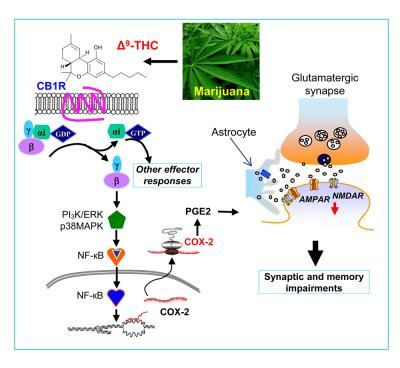Memory Loss From Marijuana Blocked By Ibuprofen; Drug Duo May Halt Alzheimer’s Progression

Marijuana’s primary side-effect as a medicine — memory loss — may soon become all but forgotten.
In a stunningly simple turn, investigators found that a simple over-the-counter painkiller, such as ibuprofen, blocks memory loss from the drug’s active ingredient, delta-9-tetrahydrocannabinol (THC). The drug combination may also prevent neurological damage from Alzheimer’s disease, opening possibilities too for the treatment of a variety of other diseases and conditions.
Nearly five millennia into the history of medical marijuana, investigators from Louisiana State University Health Sciences Center say they’ve found a way to strip marijuana’s most deleterious side effect. The discovery may prompt U.S. regulators to soon approve marijuana-based treatments for ailments beyond nausea and vomiting in chemotherapy patients.

"Our studies have solved the longtime mystery of how marijuana causes neuronal and memory impairments," lead investigator Chu Chen said Thursday in a statement. "The results suggest that the use of medical marijuana could be broadened if patients concurrently take a nonsteroidal anti-inflammatory drug such as ibuprofen."
To date, the U.S. Food and Drug Administration has approved drugs based on THC for only limited use in some cancer patients, out of concern for side effects such as memory loss. Until now, little was known about the molecular underpinnings of such neurological impairment. Using laboratory mice specially bred for the study, Chen and his colleagues found that THC treatment increased levels of an enzyme — ccyclooxygenase-2 (COX-2) — in the mouse hippocampus, an area of the brain important to learning and memory.
Subsequently, they found that memory loss in mice was prevented with efforts to reduce COX-2 levels, using either genetic techniques or drug intervention. Previous work has shown the enzyme may be zapped by simple over-the-counter medications, such as ibuprofen and other nonsteroidal anti-inflammatories. Moreover, Chen and his colleagues found that THC prevented memory loss from Alzheimer’s in the mouse model, an effect that persisted when coupled with treatment reducing COX-2 levels, and thus blocking any memory loss from the marijuana.
Chen pointed out the market’s dearth of effective medications for not only preventing and managing Alzheimer’s but for stopping progression of the disease. "Our results suggest that the unwanted side effects of cannabis could be eliminated or reduced, while retaining its beneficial effects, by administering a COX-2 inhibitor along with [delta-9-THC] for the treatment of intractable medical conditions such as Alzheimer's disease." The common form of dementia, Alzheimer’s worsens in an increasingly debilitating progression leading to death. First described by scientists in the early 20th century, the neurodegenerative disease affects 26.6 million people around the world, and is predicted to strike one in 85 people by 2050.
Source: Chen, Rongqing, Zhang, Jian, Fan, Ni, Teng, Zhao-gian, Wu, Yan. Δ9-THC-Caused Synaptic and Memory Impairments Are Mediated through COX-2 Signaling. Cell. 2013.
Published by Medicaldaily.com



























